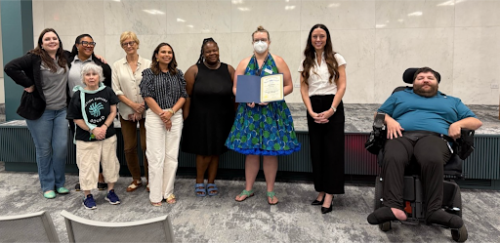
In this issue of Capitol Connection, we bring you the latest updates from Congress, including developments in the appropriations and reconciliation processes. You’ll also find important news on recent administrative actions, particularly those involving the Departments of Education and Health and Human Services. As always, we encourage you to visit the Autism Society’s Action Center to connect with your Members of Congress and advocate for policies that support individuals with Autism and their families.
Congressional Updates
Appropriations
Congress passed, and the President signed into law, a full year Continuing Resolution (CR) to fund the Government through September. Unlike previous CRs, this legislation does not include specific instructions or funding levels for individual programs, leaving spending details for agencies uncertain. The measure does reduce non-defense program funding by approximately $13 billion.
Congress now turns their focus to reconciliation and fiscal year 2026 funding. The House and Senate have started their 2026 budget process by allowing Members and organizations to submit specific funding requests for programs. The Autism Society is continuing to advocate on the Hill for adequate funding for programs such as activities under the Autism CARES Act and the DD Act, along with all relevant funding under the Department of Education. The Administration will formally kick off the budget process when it releasing their budget request, which will likely be in mid-May. House and Senate Committees will then start reviewing the requests from each Department before drafting their own legislative text to fund the government for FY26.
Reconciliation
After passing separate budget instructions to start the reconciliation process, House, Senate, and Administration leaders gathered to reach an agreement on the instructions. This led to the House and Senate passing new instructions that essentially combined elements of the two previously different versions. The new compromise resolution includes the concerning instruction of an $880 billion cut over ten years to programs overseen by the House Energy and Commerce Committee. The Senate moved first and passed the resolution with a vote of 51-48, with Senators Rand Paul (R-KY) and Susan Collins (R-ME) being the only Republicans to vote against it.
Senators Josh Hawley (R-MO) and Ron Wyden (D-OR) introduced an amendment to remove the $880 billion cut to the House Energy and Commerce Committee, but the vote on the amendment failed at 50-49. The House then passed the resolution with a vote of 216-214, with Representatives Massie (R-KY) and Spartz (R-IN) being the only Republican “nay” votes.
Committees will begin work on specifics to meet the resolution’s instructions when they return from recess on April 28. It is unknown what specific proposals may be included to reach the $880 billion cut, but it continues to seem highly improbable to achieve that number without significant changes to the Medicaid program— such as work requirements, changes to the Federal Medical Assistance Percentage (FMAP) for the expansion population or more. 12 House Republicans sent a letter to party leadership urging them not to harm Medicaid funding. The Autism Society continues to urge advocates to contact their Members of Congress to explain the importance of Medicaid to our community.
Administration Updates
HHS Restructuring
The Department of Health and Human Services (HHS) announced on March 27 a restructuring and reduction in force involving over 20,000 employees. The restructuring includes breaking up the work of the Administration for Community Living (ACL) and redistributing it among various other agencies. It also includes moving the Substance Abuse and Mental Health Services Administration (SAMHSA) and the Health Resources and Services Administration (HRSA) into a new agency called the Administration for a Healthy America.
The Autism Society released a statement in opposition, highlighting concerns for the Autism community. This type of large-scale restructuring cannot be done solely through Executive Order and press releases but will require Congressional action.
A sign-on letter was sent to Congressional leaders, led by the American Association of People with Disabilities, with over 400 organizations urging Congress to use its oversight authority to halt this dismantling, hold hearings, and ensure that Americans with disabilities and older adults are not harmed. The Senate Health, Education, Labor, and Pensions (HELP) Committee Chair, Senator Cassidy (R-LA), and Ranking Member, Senator Sanders (I-VT), sent a letter inviting the Secretary of HHS, Robert F. Kennedy Jr., to testify on the restructuring on April 10, but the Secretary declined.
HHS Updates on Autism
During a cabinet meeting on April 10, HHS Secretary Kennedy announced the launch of a research initiative tasked with finding the cause of the “autism epidemic,” with the goal of eliminating “those exposures.” The Autism Society released a statement highlighting that these claims are harmful, misleading, and unrealistic.
The Secretary continued to double down on his claims at a press conference following the release of the new Autism and Developmental Disabilities Monitoring (ADDM) Network findings on autism prevalence. He labeled the new prevalence rate of 1 in 31 as an epidemic that is preventable and in need of solving.
The Autism Society led a joint statement with the Autistic Self Advocacy Network, Autism Speaks, The Arc of the United States, the Autistic Women & Nonbinary Network, the Autistic People of Color Fund, and 40+ partner organizations, calling for science-based decision-making and increased investment in the research, programs, and services the autism community needs to live fully.
Department of Education
The Administration signed an Executive Order (EO) on March 20 ordering the closure of the U.S. Department of Education. The EO includes no details on when or how this should occur, leaving that discretion to the Secretary, Linda McMahon.
The Autism Society released a statement describing the harm this action could cause to students with disabilities and their families—particularly in terms of oversight of the Individuals with Disabilities Education Act (IDEA) and Section 504 of the Rehabilitation Act.
Christopher Banks, CEO and President of the Autism Society, joined fellow CEOs from The Arc of the United States, the National Center for Learning Disabilities, the Council for Exceptional Children, COPAA, and the Center for Learner Equity to discuss concerns with this EO. An EO is not law; therefore, Congress would need to act for these changes to take effect and would have to reassign programs such as IDEA Parts B, C, and D, along with all other relevant programs, to other agencies. It remains unclear what will happen next.
Senator Blunt Rochester (D-DE), with the support of the Autism Society, joined 22 other Senators in sending a letter to Secretary McMahon asking about her plans for the future of the Department and how programs critical to students with disabilities will be impacted. Please continue using our Action Alert to educate your Members of Congress on the importance of the Department of Education for the Autism community.
State Updates
Update on 504 Case
The case led by Texas and 17 other states challenging the constitutionality of Section 504 of the Rehabilitation Act has been dropped. Disability advocacy groups were extremely concerned about the case, as the states had asked the Court to rule that the entirety of Section 504 was unconstitutional.
The states have withdrawn the original case and have now refiled it in collaboration with HHS, asking the Court to rule that the Section 504 rule issued under the previous Administration—specifically the inclusion of “gender dysphoria” as a protected disability—is unconstitutional. Find updates on the case at the Disability Rights Education & Defense Fund’s webpage.
Colorado Bill
The Autism Society of America worked with our Colorado affiliate to pass legislation in the state requiring all post-secondary institutions in Colorado to accept IEPs and 504 plans as proof of disability status. This addresses a significant barrier many students face when entering any type of college setting.
Many schools currently require a new evaluation, forcing individuals and families to spend thousands of dollars and wait for a doctor’s availability. This new law ensures that schools must at least accept 504 plans or IEPs as valid documentation to begin the college accommodation process.
Louisiana Advocacy Breakfast

Autism Society of Louisiana Affiliate Leaders with Gov. Landry Staff
The Autism Society of Louisiana, along with multiple affiliates from across the state, held their first-ever Autism Advocacy Breakfast, where they highlighted their affiliates’ roles and emphasized the importance of health and education to state lawmakers and other stakeholders.
The Governor’s Office of Disability Affairs attended the breakfast and presented a certificate of recognition to the Autism Society of Louisiana on behalf of Governor Landry.
Wisconsin Advocacy Day

Autism Society of Wisconsin Affiliate Leaders and President/CEO Chris Banks with State Lawmaker Sheila Stubbs
The two affiliates in Wisconsin, the Autism Society of South Central Wisconsin and Autism Society of Greater Wisconsin, held their Autism Acceptance Day at the State Capitol on April 2, 2025. Governor Tony Evers (D-WI) presented the advocates with an official proclomation proclaiming April as Autism Acceptance Month.
Share:





